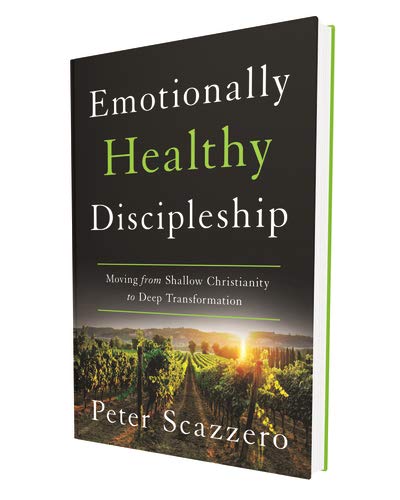
If you are looking for a book to read over the holidays to truly take some time to work through, I’d highly recommend Pete Scazzero’s Emotionally Healthy Discipleship. I blogged about his book Emotionally Healthy Leader 5 years ago HERE. I’ve given away a lot of copies of that book and have already given away a copy of this book as well. This book is not meant to be read quickly. Another reason I’d recommend it now is that the new year often leads people towards resolutions and new rhythms. We are still living in the midst of the COVID-19 pandemic and everything in our culture tells us to “protect ourselves” when the gospel says “tell everyone how vulnerable and weak you are” so that Christ may get the glory.
I highlighted several things while reading and posted those notes below…
- Emotionally healthy discipleship is an invitation to radically shift towards the real thing, a discipleship that is heavy, load-bearing stone. p. xvi
- Emotionally Health Discipleship
- Slows down our lives to cultivate a deep, personal relationship with Jesus amidst the hurry and distractions that routinely overload us.
- Offers guidelines to determine how much the values and goals of Western culture have compromised, or even negated, the radical call of Jesus to deny ourselves, take up our cross, and follow him.
- Makes provision for surrendering to, rather than fighting against, the gift of God’s limits in our lives.
- Integrates sadness and loss into our following of Jesus. As a result we no longer miss out on the treasures God has buried within them.
- Provides clear criteria to measure spiritual maturity by how we are growing in our ability to love others.
- Connects how our family of origin and personal history influence our discipleship in the present. We no longer treat deep patterns and trauma from the past with a quick fix.
- Embraces weakness and vulnerability as core to accessing God’s power and offering his love to the world. p. xvii
- What are the beneath-the-surface failures that undermine deep discipleship and keep people from becoming spiritually mature? p. 5
- I’ve become convinced that implementing a robust and in-depth discipleship for our people requires that we address at least four fundamental failures:
- We tolerate emotional immaturity.
- We emphasize doing for God over being with God.
- We ignore the treasures of church history.
- We define success wrongly. p. 5
- Work for God that is not nourished by a deep interior life with God will eventually deteriorate–and us with it. p. 13
- Emotionally Healthy Discipleship: 7 Marks of a Biblical discipleship that deeply transforms lives…
- Be before you do
- Follow the crucified — not the Americanized — Jesus
- Embrace God’s gift of limits
- Discover the treasures hidden in grief and loss
- Make love the measure of spiritual maturity
- Break the power of the past
- Lead out of weakness and vulnerability p. 25
- An emotionally healthy disciple slows down to be with Jesus, goes beneath the surface of their life to be deeply transformed by Jesus, and offers their life as a gift to the world for Jesus. p. 26
- Discretion is the practice of waiting with prayerful expectation to see what unfolds. It has the humility and patience to discern when to leave things alone, knowing when our interference will only complicate things. Flowing from a space of silence and stillness, discretion gives us, as the apostle Paul wrote, the keen ability to distinguish between good and evil spirits (1 Corinthians 12:10). Moreover, it enables us to exercise self-control, and to wait. p. 84
- What limits do I need to receive and submit to joyfully as God’s invitation to trust him?
- What limits is God asking me to break through by faith so that others might know him, or so that I might become the person he intends? p. 95
- It is impossible to be spiritually mature while remaining emotionally immature. p. 139
- Three Questions to consider (from David Benner in his book Soulful Spirituality)
- Am I fully present or distracted?
- Am I loving or judging?
- Am I open or closed to being changed? p. 144
- Over the years, I’ve identified four core characteristics of an emotionally healthy discipleship that embodies weakness and vulnerability:
- Develop a theology of weakness.
- Embrace the gift of your limp.
- Transition to become a church based on weakness.
- Practice vulnerability daily. p. 190

